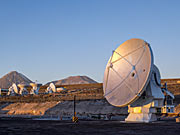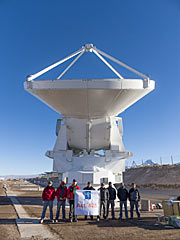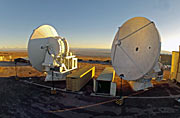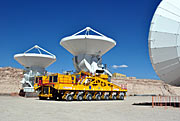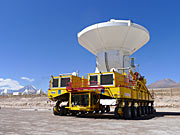Persbericht
Laatste antenne geleverd aan ALMA
Alle 66 ALMA-antennes zijn nu overgedragen aan de sterrenwacht
1 oktober 2013
De laatste antenne voor de Atacama Large Millimeter/submillimeter Array (ALMA) is zojuist overgedragen aan de ALMA-sterrenwacht. De 12 meter grote schotel is vervaardigd door het Europese AEM Consortium en completeert de succesvolle overdracht van in totaal 25 Europese antennes – het grootste ESO-contract tot nu toe.
De antenne is de 66ste en laatste die aan de sterrenwacht wordt overgedragen. Noord-Amerika heeft 25 12-meter antennes geleverd, en Oost-Azië vier schotels van 12 meter en twaalf van 7 meter. Naar verwachting zullen alle 66 ultra-nauwkeurige radioantennes voor millimeter- en submillimetergolflengten eind dit jaar als één telescoop samenwerken. Deze array strekt zich over een afstand van maximaal zestien kilometer uit over de Chajnantor-hoogvlakte in de Atacamawoestijn in het noorden van Chili.
De ALMA-sterrenwacht werd in maart 2013 officieel in gebruik gesteld door de president van Chili, Sebastián Piñera (eso1312). Die gebeurtenis markeerde de voltooiing van alle belangrijke systemen van de reuzentelescoop en de formele overgang van bouwproject naar volwaardige sterrenwacht.
Met de levering van de laatste antenne is de antennebouwfase van ALMA afgerond [1]. Alle 66 antennes zijn nu beschikbaar voor wetenschappelijk onderzoek – het begin van een nieuw tijdperk van astronomische ontdekkingen. 'Dit is een belangrijke mijlpaal voor de ALMA-sterrenwacht, omdat hij astronomen in Europa en elders in staat stelt om de volledige stralingsgevoeligheid van de ALMA-telescoop te benutten,’ zegt Wolfgang Wild, de Europese ALMA-projectmanager.
De overdracht van de laatste Europese antenne markeert de succesvolle afronding van het grootste ESO-contract tot nu toe. Het contract met het AEM Consortium [2] omvatte het ontwerp, de constructie, het transport en de installatie van de 25 antennes.
ALMA helpt astronomen bij de beantwoording van belangrijke vragen over onze kosmische oorsprong. De telescoop neemt het heelal waar op golflengten van een millimeter en minder. De straling in dit deel van het elektromagnetische spectrum is afkomstig van kosmische objecten die tot de koudste of de verste in hun soort behoren. Het gaat dan om koude wolken van gas en stof waarin nieuwe sterren worden geboren en verre sterrenstelsels aan de grens van het waarneembare heelal.
Het heelal is nog relatief weinig onderzocht op submillimetergolflengten, omdat de telescopen niet alleen extreem droge atmosferische omstandigheden nodig hebben, zoals die op Chajnantor, maar ook grote antennes en geavanceerde detectoren. Zelfs voor zijn voltooiing is ALMA al veel gebruikt voor wetenschappelijke doeleinden, wat tot de publicatie van tal van spannende resultaten heeft geleid (zie eso1336, eso1334, eso1333, eso1331, eso1325, eso1318, eso1313 and eso1234).
Noten
[1] ESO is ook verantwoordelijk voor de Residencia, waar bezoekende staf zal worden ondergebracht.
[2] Het AEM Consortium bestaat uit Thales Alenia Space, European Industrial Engineering en MT-Mechatronics.
Meer informatie
De Atacama Large Millimeter/submillimeter Array (ALMA), een internationale astronomische faciliteit, is een samenwerkingsverband van Europa, Noord-Amerika en Oost-Azië, met steun van de republiek Chili. De bouw en het beheer van ALMA worden namens Europa geleid door ESO, namens Noord-Amerika door het National Radio Astronomy Observatory (NRAO) en namens Oost-Azië door het National Astronomical Observatory of Japan (NAOJ). De overkoepelende leiding en het toezicht op bouw, ingebruikname en beheer van ALMA is in handen van het Joint ALMA Observatory (JAO).
ESO is de belangrijkste intergouvernementele astronomische organisatie in Europa en de meest productieve sterrenwacht ter wereld. Zij wordt ondersteund door vijftien landen: België, Brazilië, Denemarken, Duitsland, Finland, Frankrijk, Italië, Nederland, Oostenrijk, Portugal, Spanje, Tsjechië, het Verenigd Koninkrijk, Zweden en Zwitserland. ESO voert een ambitieus programma uit, gericht op het ontwerpen, bouwen en beheren van grote sterrenwachten die astronomen in staat stellen om belangrijke wetenschappelijke ontdekkingen te doen. Ook speelt ESO een leidende rol bij het bevorderen en organiseren van samenwerking op astronomisch gebied. ESO beheert drie waarnemingslocaties van wereldklasse in Chili: La Silla, Paranal en Chajnantor. Op Paranal staan ESO’s Very Large Telescope (VLT), de meest geavanceerde optische sterrenwacht ter wereld, en twee surveytelescopen: VISTA werkt in het infrarood en is de grootste surveytelescoop ter wereld en de VLT Survey Telescope is de grootste telescoop die uitsluitend is ontworpen om de hemel in zichtbaar licht in kaart te brengen. ESO is ook de Europese partner van de revolutionaire telescoop ALMA, het grootste astronomische project van dit moment. Daarnaast bereidt ESO momenteel de bouw voor van de 39-meter Europese Extremely Large optical/near-infrared Telescope (E-ELT), die ‘het grootste oog op de hemel’ ter wereld zal worden.
Links
Contact
Wolfgang Wild
European ALMA Project Manager, ESO
Garching bei München, Germany
Tel: +49 89 3200 6716
E-mail: wwild@eso.org
Stefano Stanghellini
ALMA Antenna Project Manager, ESO
Garching bei München, Germany
Tel: +49 89 3200 6570
E-mail: sstanghe@eso.org
Richard Hook
ESO, Public Information Officer
Garching bei München, Germany
Tel: +49 89 3200 6655
Mobiel: +49 151 1537 3591
E-mail: rhook@eso.org
Marieke Baan (Perscontact Nederland)
ESO Science Outreach Network
en NOVA Informatie Centrum
Tel: +31(0)20-5257480
E-mail: eson-netherlands@eso.org
Over dit bericht
| Persberichten nr.: | eso1342nl |
| Naam: | Atacama Large Millimeter/submillimeter Array |
| Type: | Unspecified : Technology : Observatory : Facility |
| Facility: | Atacama Large Millimeter/submillimeter Array |
Our use of Cookies
We use cookies that are essential for accessing our websites and using our services. We also use cookies to analyse, measure and improve our websites’ performance, to enable content sharing via social media and to display media content hosted on third-party platforms.
ESO Cookies Policy
The European Organisation for Astronomical Research in the Southern Hemisphere (ESO) is the pre-eminent intergovernmental science and technology organisation in astronomy. It carries out an ambitious programme focused on the design, construction and operation of powerful ground-based observing facilities for astronomy.
This Cookies Policy is intended to provide clarity by outlining the cookies used on the ESO public websites, their functions, the options you have for controlling them, and the ways you can contact us for additional details.
What are cookies?
Cookies are small pieces of data stored on your device by websites you visit. They serve various purposes, such as remembering login credentials and preferences and enhance your browsing experience.
Categories of cookies we use
Essential cookies (always active): These cookies are strictly necessary for the proper functioning of our website. Without these cookies, the website cannot operate correctly, and certain services, such as logging in or accessing secure areas, may not be available; because they are essential for the website’s operation, they cannot be disabled.
Functional Cookies: These cookies enhance your browsing experience by enabling additional features and personalization, such as remembering your preferences and settings. While not strictly necessary for the website to function, they improve usability and convenience; these cookies are only placed if you provide your consent.
Analytics cookies: These cookies collect information about how visitors interact with our website, such as which pages are visited most often and how users navigate the site. This data helps us improve website performance, optimize content, and enhance the user experience; these cookies are only placed if you provide your consent. We use the following analytics cookies.
Matomo Cookies:
This website uses Matomo (formerly Piwik), an open source software which enables the statistical analysis of website visits. Matomo uses cookies (text files) which are saved on your computer and which allow us to analyze how you use our website. The website user information generated by the cookies will only be saved on the servers of our IT Department. We use this information to analyze www.eso.org visits and to prepare reports on website activities. These data will not be disclosed to third parties.
On behalf of ESO, Matomo will use this information for the purpose of evaluating your use of the website, compiling reports on website activity and providing other services relating to website activity and internet usage.
Matomo cookies settings:
Additional Third-party cookies on ESO websites: some of our pages display content from external providers, e.g. YouTube.
Such third-party services are outside of ESO control and may, at any time, change their terms of service, use of cookies, etc.
YouTube: Some videos on the ESO website are embedded from ESO’s official YouTube channel. We have enabled YouTube’s privacy-enhanced mode, meaning that no cookies are set unless the user actively clicks on the video to play it. Additionally, in this mode, YouTube does not store any personally identifiable cookie data for embedded video playbacks. For more details, please refer to YouTube’s embedding videos information page.
Cookies can also be classified based on the following elements.
Regarding the domain, there are:
- First-party cookies, set by the website you are currently visiting. They are stored by the same domain that you are browsing and are used to enhance your experience on that site;
- Third-party cookies, set by a domain other than the one you are currently visiting.
As for their duration, cookies can be:
- Browser-session cookies, which are deleted when the user closes the browser;
- Stored cookies, which stay on the user's device for a predetermined period of time.
How to manage cookies
Cookie settings: You can modify your cookie choices for the ESO webpages at any time by clicking on the link Cookie settings at the bottom of any page.
In your browser: If you wish to delete cookies or instruct your browser to delete or block cookies by default, please visit the help pages of your browser:
Please be aware that if you delete or decline cookies, certain functionalities of our website may be not be available and your browsing experience may be affected.
You can set most browsers to prevent any cookies being placed on your device, but you may then have to manually adjust some preferences every time you visit a site/page. And some services and functionalities may not work properly at all (e.g. profile logging-in, shop check out).
Updates to the ESO Cookies Policy
The ESO Cookies Policy may be subject to future updates, which will be made available on this page.
Additional information
For any queries related to cookies, please contact: pdprATesoDOTorg.
As ESO public webpages are managed by our Department of Communication, your questions will be dealt with the support of the said Department.

